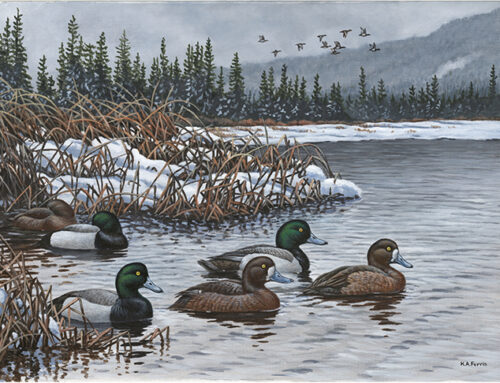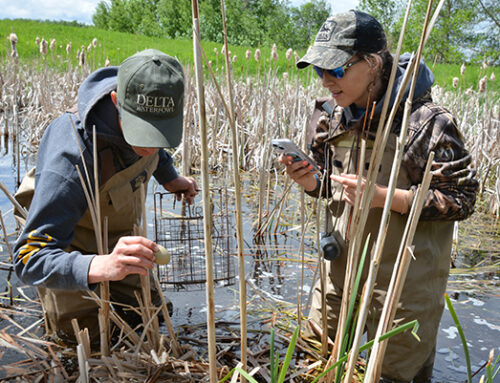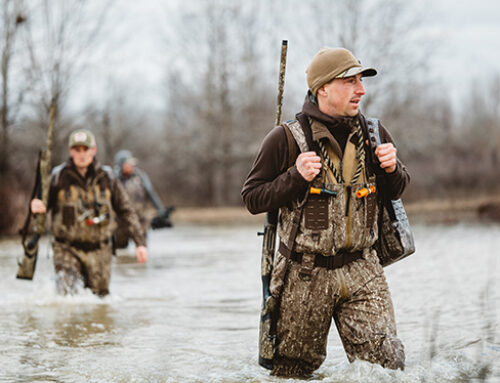Delta’s Student Field Course Trains Future Conservation Leaders

The nine-day event provided an immersive experience of the PPR’s importance to breeding ducks
In June, a dozen aspiring waterfowl biologists gained an unparalleled, hands-on experience of the prairie pothole region’s critical importance to breeding ducks. Selected from a competitive pool of applicants, graduate students in Delta Waterfowl’s Graduate Field Course undertook a nine-day curriculum that combined education, fieldwork, and networking with some of the brightest minds in the field.

Photo courtesy of Ava Britton, a University of Nebraska graduate student who was energized by Delta’s course to continue studying ducks.
“If you’re a wildlife student who aspires to study ducks and become an exceptional biologist, you have to spend time in the PPR,” said Dr. Chris Nicolai, Delta’s waterfowl scientist. “Reading about duck ecology and studying it intensively in the classroom are great building blocks, but nothing tops direct exposure to the wetlands and habitat ecosystems that drive North American duck production. Additionally, the opportunity to build networks is huge. Graduate students may attend a conference or two, or they may even be the only graduate student at their university who’s studying ducks or wetlands. In this class, they get an extended period to develop networks that will likely benefit them throughout their career.”
Joined by Delta Waterfowl and its assisting partners—including Ducks Unlimited, U.S. Fish and Wildlife Service, Canadian Wildlife Service, Manitoba Habitat Heritage Corporation, Manitoba Wildlife Branch, and Northern Prairie Wildlife Research Center—the graduate students gathered on June 11, 2024, in Bismarck, North Dakota, where they were treated to presentations inside Delta’s headquarters office and an evening fish fry hosted by Delta president Dr. Frank Rohwer and retired USFWS biologist Chuck Loesch.
Over the next week and a half, they journeyed into the wetland- and waterfowl-rich couteau region of North Dakota for an immersive experience of searching for nests and nesting ducks; they also traveled into Manitoba’s vast prairie and parkland habitats, where Delta is researching the use of drones to enhance duck production surveys, among other program and research efforts.
“The goal of the Graduate Field Course was to provide students who had little exposure to the PPR with the foundational knowledge and practical skills necessary to be effective, more broadly-thinking waterfowl managers by learning about the most important puddle duck breeding area,” Nicolai said. “I think we achieved all that and then some this summer. And on a personal level, it’s rewarding to give back and inspire talented students to continue with waterfowl-centric degrees.”
Prairie Perspective
The best place to achieve these learning opportunities is, of course, in the heart of North America’s “Duck Factory,” the prairie pothole region. That’s where Delta Waterfowl focuses vital deliveries of its core Habitat Conservation and Duck Production programs because it’s where we can have maximum impact in boosting the fall flight.
“Students may have learned all about the potholes (small, seasonal and semi-permanent wetlands) dotting the landscape, including why they are the engines that drive production of mallards, pintails, and canvasbacks,” Nicolai said. “And they may know about the massive densities of ducks that breed in the PPR and that the ducks that fly out of it represent a substantial slice of the hunter harvest pie. But until they literally breathe and soak it in and see those awe-inspiring numbers of ducks going about the business of making more ducks, it’s hard to fully appreciate the importance and function of the landscape.”
In supporting Delta Waterfowl as a member or donor, you’ve helped send these graduate students into the PPR through the Graduate Field Course and other endeavors. Students were responsible for traveling to and from Bismarck for the field course, but major costs, such as lodging, food, and other related expenses during the course, were covered by Delta’s donors—most especially Dr. Luke Laborde of Louisiana State University, and the men and women who’ve pledged gifts to Delta’s Million Duck Campaign, the organization’s groundbreaking effort to produce one million ducks every year, forever—and partnering organizations.
Therefore, your membership in The Duck Hunters Organization plays a role in ensuring that the next generation of waterfowl biologists are intimately familiar with the critical importance of protecting and enhancing the PPR landscape.
Ava Britton, a master’s student in the University of Nebraska’s School of Natural Resources, was impressed by the scale of the prairie pothole region.
“Being there and seeing all of the little potholes and really, actually seeing all of the nesting ducks was incredible,” Britton said in a news story released in September by the University of Nebraska. “It definitely doesn’t compare to just reading about it.”
Hands-On Experience
The Graduate Field Course offers a rare combination of theoretical learning and practical field experience. Activities in the field including the conducting of nest searches, “candling” eggs to determine their phase of incubation, and learning techniques for assessing nest success and waterfowl population dynamics. By physically searching for nests and examining a variety of species’ eggs, students gained insight into the critical factors that influence nesting success, such as predation, habitat quality, and variable weather conditions.
Additionally, students reported that banding ducks was among their favorite opportunities. For some, Delta’s field course provided the first-ever chance to handle live waterfowl.
Britton mentioned that she learned more advanced research techniques, such as following marked individuals by attaching nasal saddles (designed to fall harmlessly away shortly after the nesting season) and leg-banding several hen canvasbacks. The saddles are emblazoned with numbers that are visible at a distance, allowing perfect identification to aid in researching duck production rates and the accuracy of drone/thermal camera techniques. However, while Britton had banded ducks before, she’d never attached a nasal saddle.
“I was intimidated by doing that,” she told the news story’s author, Ronica Stromberg. “I was pretty nervous, but it was definitely a [good] learning experience.”
Britton’s mix of trepidation and excitement was shared by fellow students and is common among participants in Delta’s student field courses and related activities.
“These experiences are invaluable in building a student’s confidence and skills in waterfowl research,” Nicolai said.
Leading Network
One of the greatest strengths of Delta’s Graduate Field Course is the access it provides to leading professionals in waterfowl conservation. Delta Waterfowl staff, along with experts from Ducks Unlimited, the U.S. Fish and Wildlife Service, U. S. Geological Survey, and the Canadian Wildlife Service, worked directly with the students throughout the course. These experts—many of whom were already well known by the students, if not personally—offer insights into waterfowl management strategies, habitat restoration projects, the latest research in the field, and future career opportunities. Additionally, Britton appreciated the opportunities to interact, build friendships, and swap ideas with fellow wildlife students.
“We all had such unique projects and unique backgrounds, and I think that that was extremely valuable,” she said. “We all had the opportunity to present on our own research, and that was really awesome because I was able to ask them a lot of questions and get feedback going into my first year.”
Not all the students were like-minded individuals (nor, for that matter, were the professors and waterfowl managers leading the course!) but this approach created the type of collaborative environment that’s conducive to shaping well-rounded professionals ready to tackle the complex challenges facing today’s ducks and duck hunters.
Transformative Course
Delta’s Graduate Field Course was considered by many attendees to be a transformative experience that solidified their commitment to waterfowl conservation. Britton, for example, entered the course with some hesitation, unsure whether her undergraduate-degree background studying songbirds and falcons had prepared her for the complexities of waterfowl ecology.
“Initially, I was intimidated,” she explained. “And I asked [Nebraska professors Chris Chizinski and Mark Vrtiska], ‘Are you sure you think it’s a good idea that I go, having not even started my program yet?’ And they were like, ‘Yeah, definitely. Just immerse yourself in it and just have the experience.’ And I definitely agree with them that it was, honestly, great timing for me because I feel like it laid a good foundation for me to go off of now, starting the school year.”
That was a key aim of Delta’s Graduate Field Course: Providing students with a deeper appreciation for the intricacies of waterfowl ecology and a stronger sense of purpose in their approach to ducks. Overall, students left with new skills, a network of professionals and peers, and a greater understanding of the role they can play in ensuring the future of waterfowl populations. In fact, you might think of Delta’s Graduate Field Course as more than just a learning experience—it’s an investment by you in the future of waterfowl conservation. By providing students with hands-on training in the PPR, Delta Waterfowl members like you are helping us to ensure that the next generation of biologists, managers, and policymakers are equipped with the knowledge and skills needed to sustain and grow duck populations.
For Britton, Delta’s Graduate Field Course affirmed an interest in working in waterfowl conservation and studying the human dimensions of natural resource management.
“[Delta’s course] definitely reinforced that I’m on the path that I want to be on,” she said. —Kyle Wintersteen






Leave A Comment